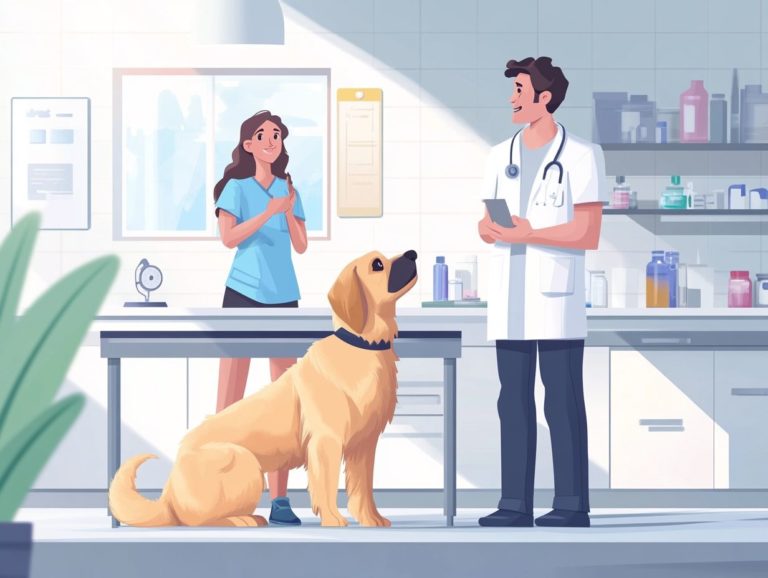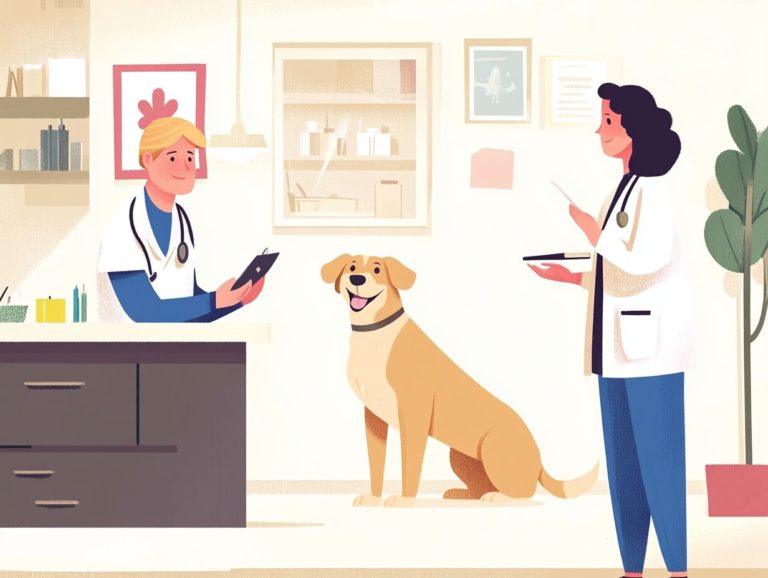What Your Vet Wants You to Know About Anxiety
Anxiety in pets is more prevalent than you might think. It often arises from various causes and triggers that can significantly affect their well-being.
Recognizing the signs and symptoms is essential for you as a pet owner. Any behavioral changes can indicate underlying distress. Your veterinarian is instrumental in diagnosing and treating these issues, guiding you toward effective management strategies.
This article delves into understanding pet anxiety, its causes, treatment options, and prevention tips, all aimed at ensuring your beloved companion feels safe and at ease.
Contents
- Key Takeaways:
- Understanding Anxiety in Pets
- Signs and Symptoms of Anxiety in Pets
- The Role of the Veterinarian
- Options for Managing Pet Anxiety
- Preventing Anxiety in Pets
- Frequently Asked Questions
- What Can Cause Anxiety in Pets?
- How Can I Help My Anxious Pet?
- Can Anxiety Be Cured in Pets?
- Are There Any Natural Remedies for Pet Anxiety?
- What Else Should I Know About My Pet’s Anxiety?
Key Takeaways:
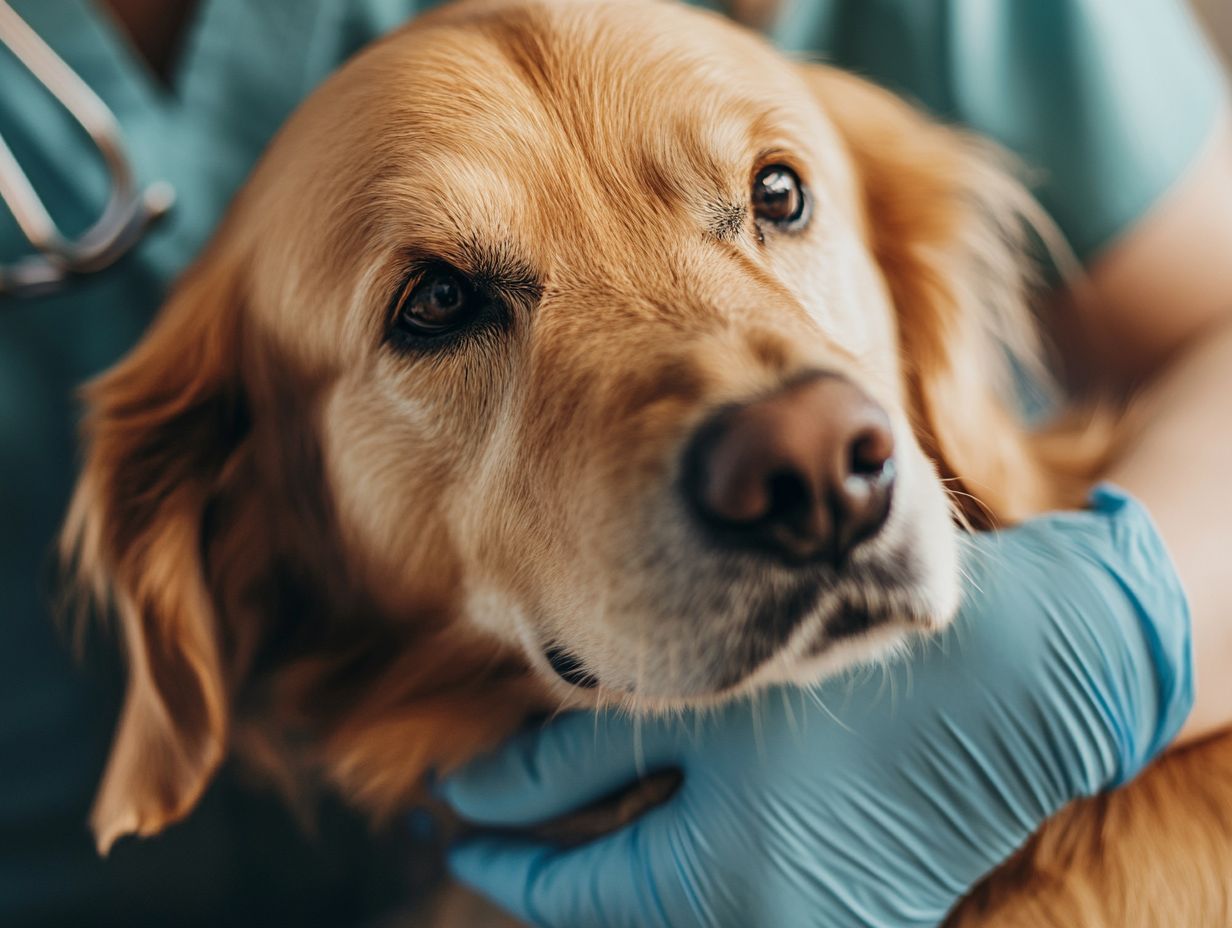
- Anxiety in pets can be caused by various factors and can manifest in different ways. It’s important to understand the individual triggers and signs in your pet.
- As pet owners, recognize changes in your pet’s behavior and seek proper diagnosis and treatment from a veterinarian to help your pet feel better.
- Preventing anxiety in pets involves creating a calm and stress-free environment, utilizing behavioral therapy which includes training techniques to help reduce anxiety and medications recommended by your veterinarian. Promote relaxation through exercise and mental stimulation.
Understanding Anxiety in Pets
Understanding anxiety in pets is essential for you as a dog owner. It influences not only the emotional well-being of your furry companion but also their overall health.
Anxiety disorders, such as separation anxiety or generalized fear, can lead to notable behavioral challenges in dogs. These challenges can affect their daily routines and the bond you share with them.
Various factors can contribute to dog anxiety, including changes in their environment, a history of trauma, and certain breeds that are more prone to stress. By recognizing the symptoms of anxiety, you can take the necessary steps to initiate timely treatment and help your pet feel better.
Causes and Triggers
The triggers of dog anxiety can vary greatly, from environmental factors to psychological issues. It is essential to seek a thorough evaluation by a veterinarian.
Common culprits include separation anxiety, where your dog may experience distress when left alone, often resulting in destructive behaviors. Changes in their environment, such as moving to a new home, can introduce significant stress, as can welcoming new family members or pets into the household. Traumatic experiences, like accidents or abuse, can leave lasting impressions that profoundly alter your dog’s behavior.
Understanding these triggers is vital, as they can heavily impact your dog’s overall well-being, leading to fears, aggression, or withdrawal. Consulting a veterinarian is crucial to ensure these issues are properly diagnosed and effectively addressed.
Signs and Symptoms of Anxiety in Pets
Recognizing the signs and symptoms of anxiety in pets is crucial for you as a dog owner. By being attentive to your furry companion’s emotional state, you can help ensure their well-being and happiness.
Recognizing Behavioral Changes
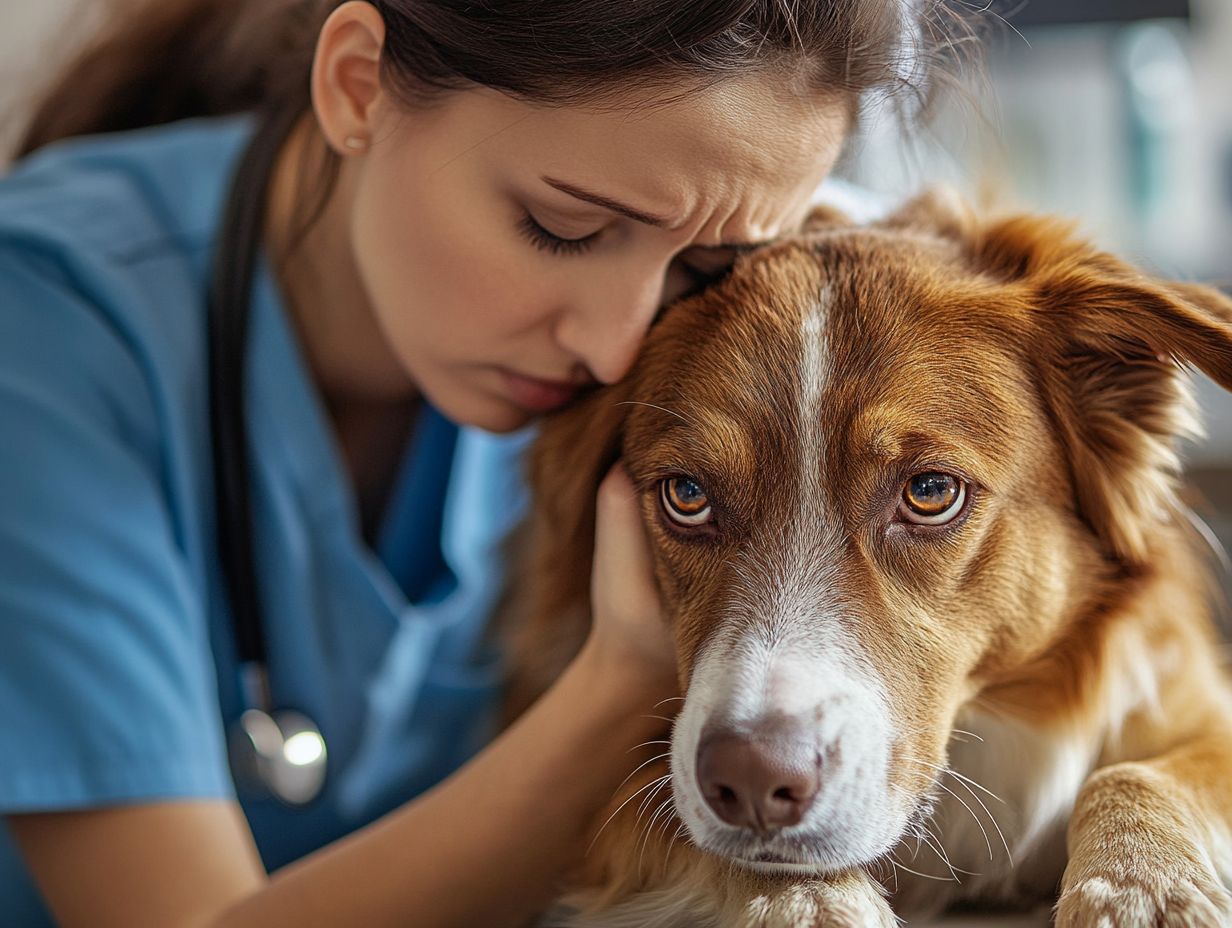
Recognizing behavioral changes is crucial in identifying anxiety symptoms in dogs. These shifts often signal underlying emotional distress.
You might notice common signs such as withdrawal from social interactions, sudden aggression toward people or other animals, and excessive barking. These can indicate that your dog is grappling with heightened anxiety.
It s essential for you to familiarize yourself with your canine’s body language. Cues like tense posture, pinned ears, or a tucked tail can provide valuable insight into their emotional state.
By responding with patience and supportive actions like creating safe spaces, engaging in calming activities, or consulting with a veterinarian when needed you can significantly enhance your pet’s emotional well-being. This helps them feel more secure and less anxious.
The Role of the Veterinarian
The veterinarian plays a pivotal role in managing dog anxiety. They offer the expertise required for accurate diagnosis and the development of customized treatment plans tailored to your pet’s specific needs.
It s vital to act quickly to help your dog feel secure! Be proactive in understanding and addressing your pet s anxiety.
Importance of Proper Diagnosis and Treatment
Proper diagnosis and treatment are essential for effectively managing your dog’s anxiety. This ensures that your pet receives the care needed for an improved quality of life.
A thorough veterinary evaluation is crucial in identifying the root causes of anxiety. These may arise from various factors, including genetics, environment, or past trauma. By understanding these underlying issues, you can make informed decisions about the most suitable treatment options for your furry friend.
Behavioral therapies, such as desensitization and counter-conditioning, can assist your dog in gradually adjusting to anxiety-inducing situations. Desensitization means slowly introducing your dog to things that make them anxious. Employing positive reinforcement techniques encourages desired behaviors while alleviating stress.
Sometimes, veterinarians might recommend anxiety medications as an additional strategy to address severe anxiety symptoms. This paves the way for a more balanced and less fearful existence for your cherished companion.
Options for Managing Pet Anxiety
You have several effective options for managing pet anxiety. Consider a combination of behavioral therapy, anxiety medications, and stress reduction techniques, all tailored to meet the unique needs of your dog.
Behavioral Therapy and Medications
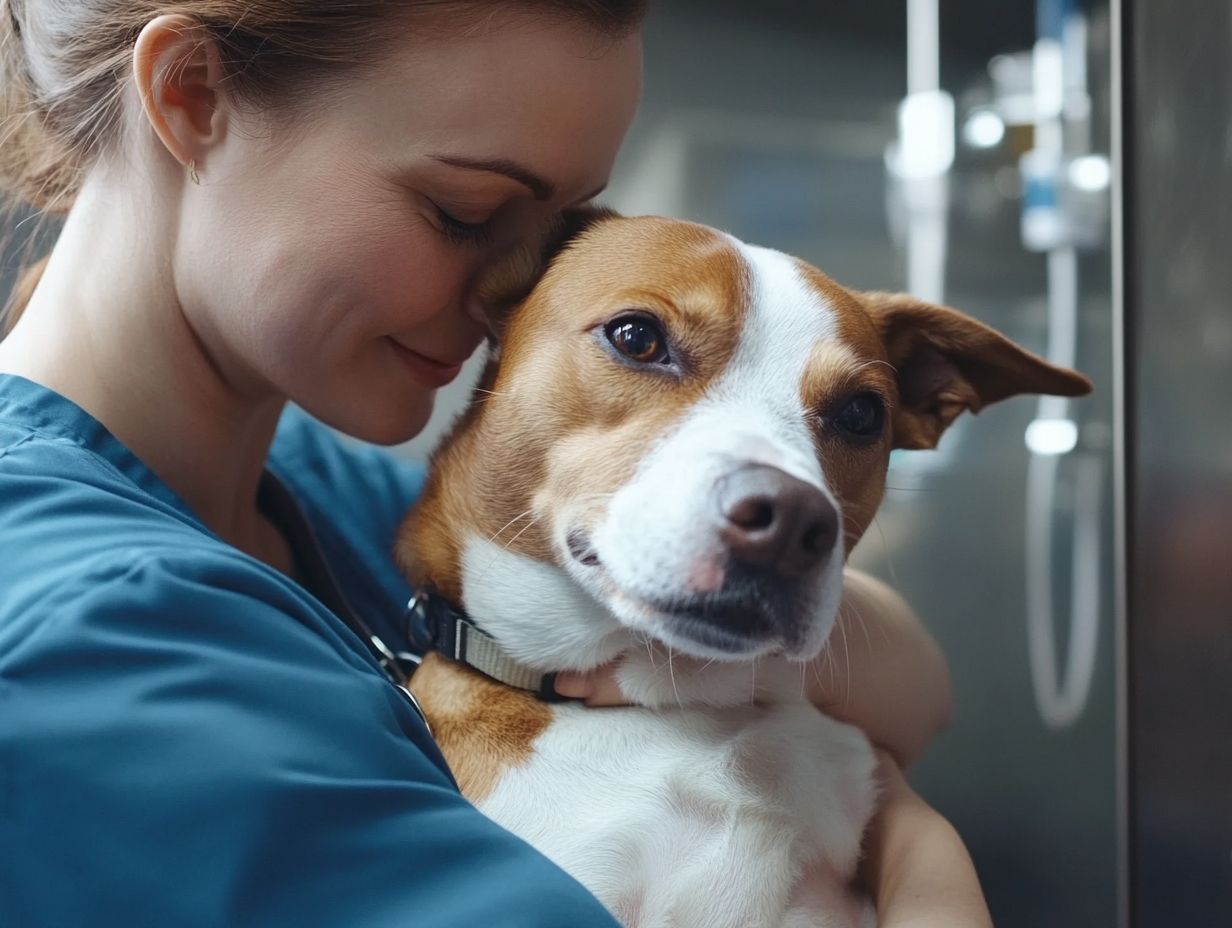
Behavioral therapy and medications work hand in hand as effective strategies for treating anxiety in dogs. They focus on both behavior modification and emotional support.
By employing techniques like desensitization and counter-conditioning, you can guide your anxious companion to gradually face and adapt to situations that once caused stress. Desensitization helps your dog become accustomed to anxiety-inducing stimuli in a controlled environment, allowing them to diminish their fear response over time.
Meanwhile, counter-conditioning helps replace the negative emotions tied to these triggers with positive feelings. This ultimately boosts your dog s confidence.
Anxiety medications such as fluoxetine and clomipramine can be invaluable allies. They alleviate symptoms, allowing your dog to engage more effectively with training. Consistently reinforcing positive behaviors through training is essential. This fosters adaptability and helps to reduce anxiety-related issues in your cherished pets.
Preventing Anxiety in Pets
Preventing anxiety is crucial! It can transform your dog’s emotional well-being.
By taking proactive steps, you can significantly reduce the chances of anxiety disorders developing in your furry friends.
Tips for Reducing Stress and Promoting Relaxation
Implementing effective strategies to reduce stress and promote relaxation can significantly enhance your dog s behavior. This will improve the quality of life for your anxious pet.
One of the simplest yet most effective methods is to utilize calming aids. These can include pheromone diffusers or anxiety wraps, creating a soothing atmosphere that your dog will appreciate. A peaceful environment is crucial maintaining a quiet space with comfortable bedding fosters a sense of safety for your furry friend.
Advocating for positive reinforcement techniques, such as rewarding calm behavior with treats, reinforces the actions you want to encourage. Establishing a consistent daily routine is also key to promoting stability and helping your dog feel more secure.
When you combine these strategies, you support overall wellness for your pet. You nurture their emotional stability and enrich the bond you share.
Frequently Asked Questions
Worried about your pet’s anxiety?
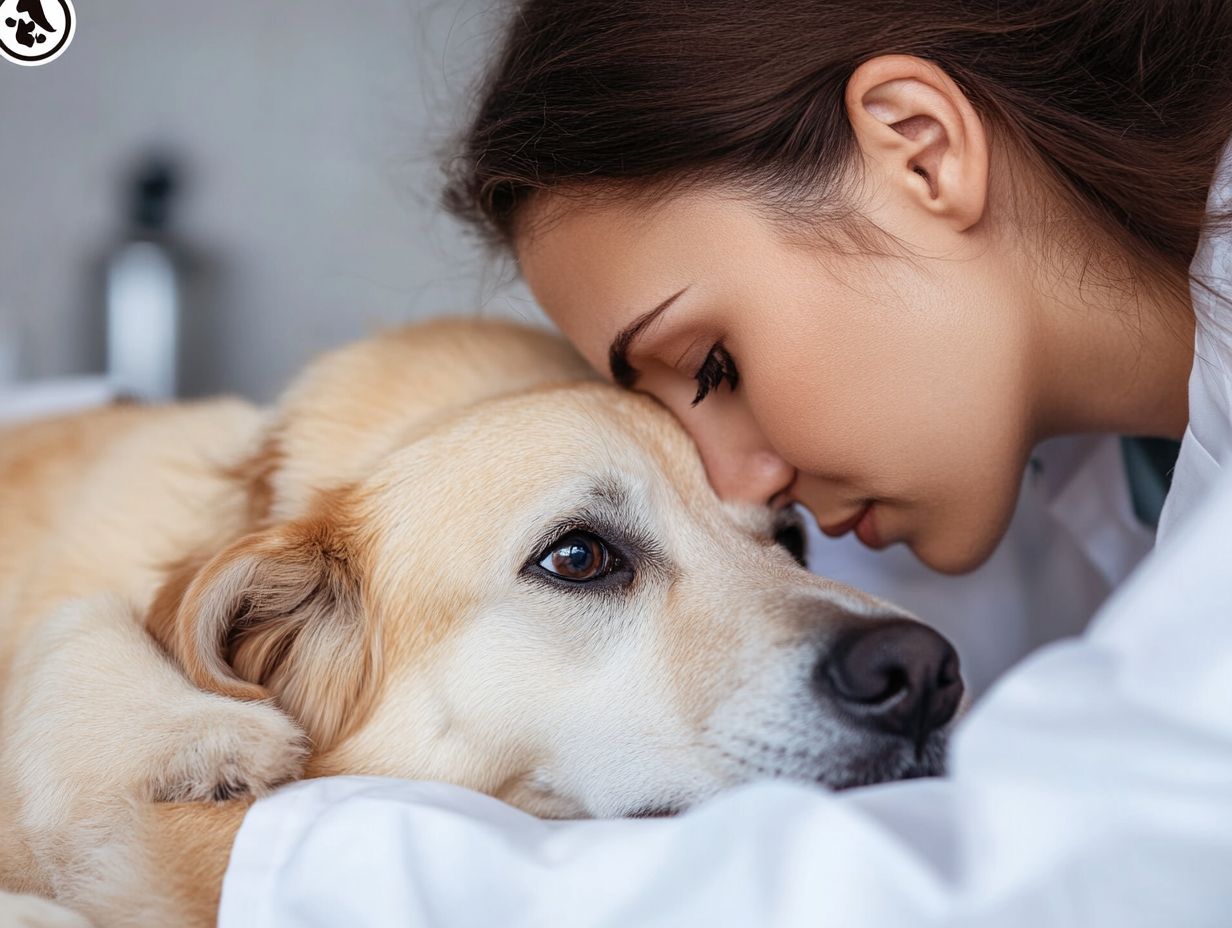
Anxiety is a common issue in pets and can greatly impact their well-being. Here are some frequently asked questions to help you understand what to do if your pet’s anxiety worsens and what your vet wants you to know about anxiety.
What are the signs of anxiety in pets?
The signs of anxiety in pets can vary. Some common ones include excessive barking or meowing, destructive behavior, hiding, avoidance, and changes in appetite or bathroom habits.
What Can Cause Anxiety in Pets?
Many factors can contribute to anxiety in pets. These include changes in routine, past trauma, separation from their owners, and genetics.
How Can I Help My Anxious Pet?
Consult your vet to find the best action plan for your pet. This plan may include training methods and medication.
Can Anxiety Be Cured in Pets?
There is no outright “cure” for anxiety in pets. However, it can be managed with a suitable treatment plan.
Are There Any Natural Remedies for Pet Anxiety?
Some owners explore natural remedies like calming sprays or supplements. Always check with your vet before trying anything new.
What Else Should I Know About My Pet’s Anxiety?
Don’t ignore anxiety in your pet. Knowing when to consult a professional for pet anxiety can provide the right understanding and support, helping them lead a happier life.

